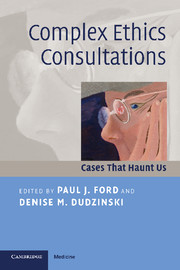Book contents
- Frontmatter
- Contents
- List of contributors
- Foreword
- Acknowledgments
- Introduction: Live and learn: courage, honesty, and vulnerability
- Part I Starting at the beginning: prenatal and neonatal issues
- Part II The most vulnerable of us: pediatrics
- Part III Diversity of desires and limits of liberty: psychiatric and psychological issues
- Part IV Withholding therapy with a twist
- 13 Listening to the husband
- 14 You're the ethicist; I'm just the surgeon
- 15 Haunted by a good outcome: the case of Sister Jane
- 16 Is a broken jaw a terminal condition?
- Part V The unspeakable/unassailable: religious and cultural beliefs
- Part VI Human guinea pigs and miracles: clinical innovations and unorthodox treatment
- Part VII The big picture: organizational issues
- Conclusions, educational activities, and references
- Index
15 - Haunted by a good outcome: the case of Sister Jane
Published online by Cambridge University Press: 03 May 2010
- Frontmatter
- Contents
- List of contributors
- Foreword
- Acknowledgments
- Introduction: Live and learn: courage, honesty, and vulnerability
- Part I Starting at the beginning: prenatal and neonatal issues
- Part II The most vulnerable of us: pediatrics
- Part III Diversity of desires and limits of liberty: psychiatric and psychological issues
- Part IV Withholding therapy with a twist
- 13 Listening to the husband
- 14 You're the ethicist; I'm just the surgeon
- 15 Haunted by a good outcome: the case of Sister Jane
- 16 Is a broken jaw a terminal condition?
- Part V The unspeakable/unassailable: religious and cultural beliefs
- Part VI Human guinea pigs and miracles: clinical innovations and unorthodox treatment
- Part VII The big picture: organizational issues
- Conclusions, educational activities, and references
- Index
Summary
Case narrative
The patient, whom I will call Sister Jane, is a 70-year-old Roman Catholic nun with a living will and power of attorney for health care naming another nun as her agent. She is in the cardiac surgical intensive-care unit after a mitral valve replacement and coronary artery bypass surgery performed emergently after a myocardial infarction. She has a history of coronary artery disease, hypertension, and a 50-pack-per-year history of smoking. Postoperative complications included acute renal failure, respiratory failure, and a pseudomonas sepsis. The patient is currently on a ventilator with a tracheostomy. The sepsis is improving. Sister Jane has been unusually oppositional and troublesome throughout her stay. Nurses describe her as a demanding patient whose postsurgical complications were rough. Nuns from her convent corroborated that Sister Jane's attitude was “difficult and challenging” in the best of circumstances.
During one of the regular ethics liaison rounds, the critical-care physician requested a formal ethics consultation because the patient had asked that all treatments be stopped. Although she had refused to cooperate with treatment in the past, these refusals were judged to be part of a difficult postoperative adjustment. When her treatment opposition was discussed with her on previous occasions, she admitted being despondent. She attributed her despondency to the difficult recovery, but in each instance she eventually accepted the treatments. At these times, Sister Jane was told she had the right to refuse life support if the treatment was more than she could bear. Despite a continuing pattern of being difficult to care for and uncooperative, Sister Jane always declined to stop or otherwise limit ongoing treatment.
- Type
- Chapter
- Information
- Complex Ethics ConsultationsCases that Haunt Us, pp. 119 - 125Publisher: Cambridge University PressPrint publication year: 2008
- 1
- Cited by



